The trail has gone cold. The police have hit a dead end. Bhandup’s Harsh Arora has disappeared from the face of the earth. His wife Reena joins scores of families swinging between hope and hell as they wait for a missing loved one to return
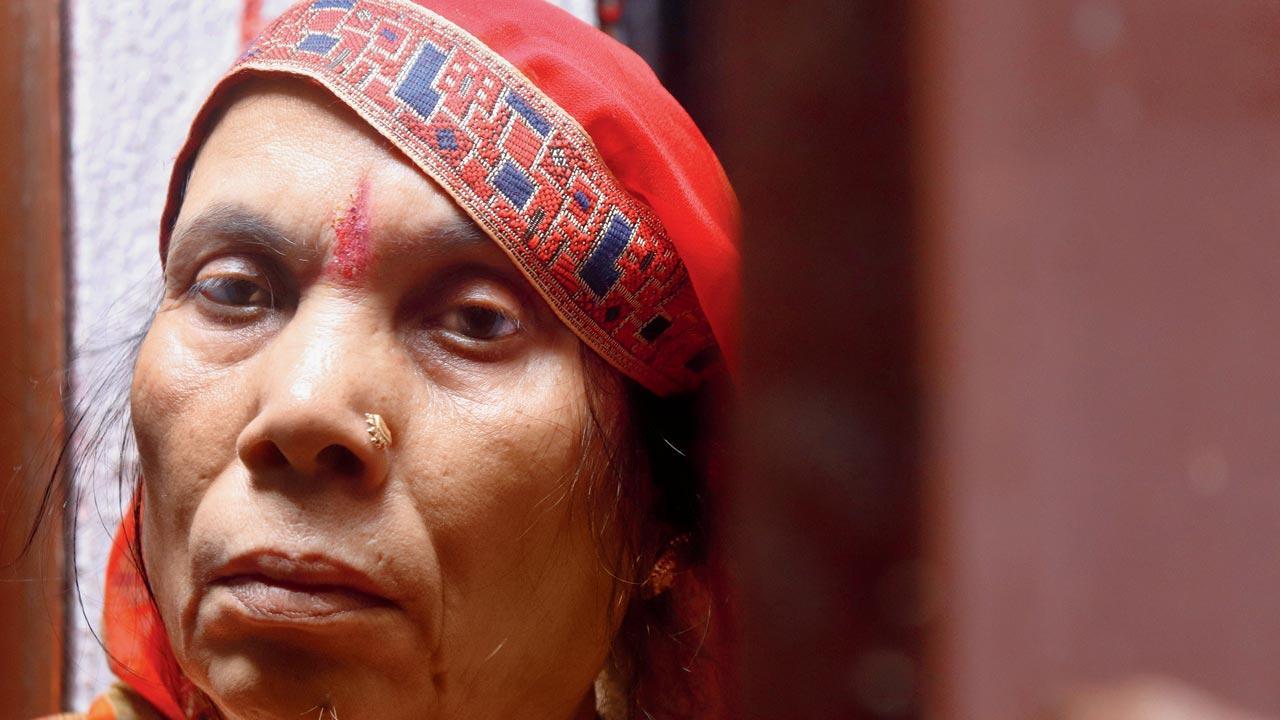
Savitri Rajbhar lost her son Vidyadhar Rajbhar and her home when he was declared mastermind in the 2015 double murder of Hema Upadhyay and Harish Bhambhani. Despite a five-state hunt, the police hit a wall. Savitri has little choice but to shuttle between her daughter’s Varanasi home and her brother’s one-room tenement in Kandivli. Pic/Anurag Ahire
The disappearance of Bhandup family man Harsh Arora from his morning walk more than a month ago is everyone’s worst fear. Holes in the legal and police system, no guidance on whom to approach, or just zero leads and a trail gone cold—not just the Aroras, so many families have been waiting with eyes peeled on the door every day.
ADVERTISEMENT
We met relatives who have not given up hope or left a stone unturned in search of the loved lost one.
1,10,221
No. of persons missing from Maharashtra in 2022 as per National Crime Records Bureau data
‘I looked closely at every Vrindavan beggar to see if he was my son’
You know what his deal is, right?” Suraj Rajbhar asks us as we pick our way through the narrow lanes of Banjar Pada area in Dindoshi. Suraj is cousin to Vidyadhar Rajbhar, who has been missing for the last eight years. He is a wanted accused in the sensational double murder of artist Hema Upadhyay and her divorce lawyer Harish Bhambhani. Last month, the Dindoshi Sessions Court convicted Hema’s estranged husband and celebrated artist Chintan Upadhyay and three others in the case. Their bodies were discovered in a storm water drain in Kandivli West, wrapped in plastic and stuffed into cardboard boxes. Bhambani’s face indicated multiple blows with a blunt weapon. Hema’s hands were tied behind her back, and the police said she may have been smothered.
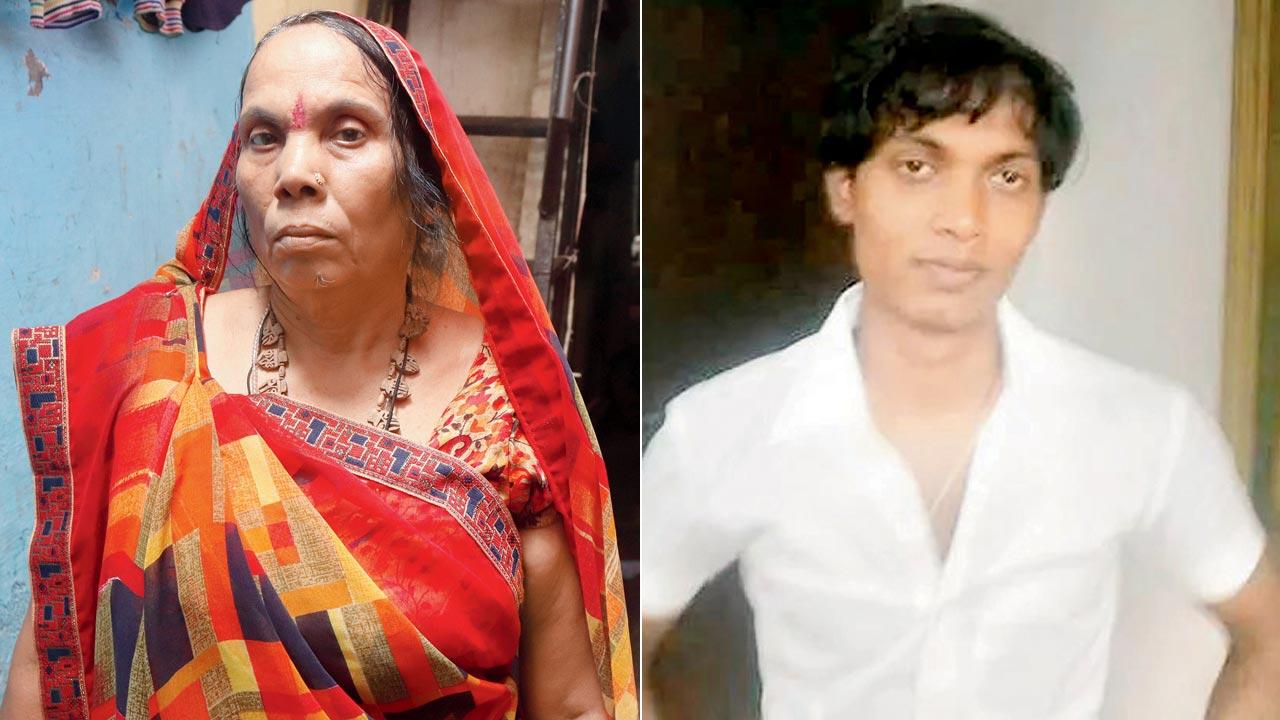 Savitri Rajbhar has had to divide her time between he brother’s Dindoshi home and her daughter’s Varanasi residence after the police sealed her Kandivali home following her son Vidyadhar Rajbhar’s arrest. Pic/Anurag Ahire; (right) Vidyadhar Rajbhar alias Gotu has been missing since 2015 His last known location according to the police was Guwahati. File pic
Savitri Rajbhar has had to divide her time between he brother’s Dindoshi home and her daughter’s Varanasi residence after the police sealed her Kandivali home following her son Vidyadhar Rajbhar’s arrest. Pic/Anurag Ahire; (right) Vidyadhar Rajbhar alias Gotu has been missing since 2015 His last known location according to the police was Guwahati. File pic
Chintan’s co-accused, Vijay, Pradeep and Shivkumar Rajbhar, were art fabricator Vidyadhar’s employees.
Suraj looks at us quizzically when we say that we are reconnecting with families dealing with the disappearance of a loved one. No one has asked them about, well, them; most of the questions the family that Vidyadhar has left behind has fielded have been about the crime that Vidyadhar stands accused of. Suraj’s immediate response when this writer identified himself is, “Oh, interview?”
The house is a single room on a mezzanine, which you reach via a narrow ladder. The lane outside can hardly hold one person. Inside the house are its five residents, including Savitri Rajbhar. Most of the time that we are there, she stares into the distance.
We ask her how old she is. She thinks hard for a long minute before answering. “Sixty… and four… no, five.”
For her, the last eight years have been a spiral into hopelessness. She has no roof over her head and is at the mercy of her relatives. The house where we meet her belongs to her brother, Abhimanyu, which she shares with his wife Madhuri, their two young children, and two other relatives. The kitchen platform is separated by a narrow strip of open space from a single mattress. Abhimanyu and his family sit on the mattress; Savitri sits on the floor, directly under large idols. They are her only source of solace.
“Our house in Kandivli was sealed immediately after the case was registered. We owned it. Vidyadhar was born there. I could not take anything from my home, not even old pictures of my son and his older sisters. Since that day, I’ve been shuttling between Mumbai and Varanasi, where my daughter is married.”
Savitri was in Varanasi in December 2015, when Hema and Bhambhani’s bodies were found. According to Savitri’s confession, two days later, Vidyadhar called her to confess that he had killed the two, but refused to reveal where he was. That was the last that anybody heard of him. Despite a five-city manhunt, the police landed nothing.
“Everybody is sympathetic but how long can I impose on anyone? I can’t stay in my daughter’s house forever and it isn’t as if my brother has money in abundance,” Savitri adds. Abhimanyu nods dejectedly. Like Vidyadhar and his father before him, he, too, was in the fabrication business, but his association with an alleged accused impacted the contracts that came to him. He no longer has a steady job, and his son Suraj supports the family by doing odd jobs.
“It breaks our heart to see her like this,” Madhuri adds. “We will always be there for her, but it is painful to see her live like a nomad.” She offers us prasad from their recent visit to Vrindavan. Savitri was there, too, but she had different priorities.
“I went around the place, looking at each and every beggar and pavement dweller to check if one of them was my son. I stop on the street and looking at each passing man carefully. Any one of them could be my son.. but eight years have passed, I don’t know if I will recognise him,” she says, as she starts sobbing.
She is battling diabetes and chronic joint pain. Walking and climbing the stairs are painful. “I don’t care what happens after he returns. I just need him to be in front of me. Right now, my life is an endless cycle of us inquiring with the police about his whereabouts and them doing the same with us,” she says, leaning her head back against the wall.
‘Can the President of Kenya not supervise one investigation properly?’
Iftikhar Khan is patient and polite to a fault. He is speaking to us via videocall from Dubai, where he stays with his wife. It has taken a few attempts to connect, but he has shown no irritation. It is only when he starts talking that the weight of the last one-and-a-half years begins to show.
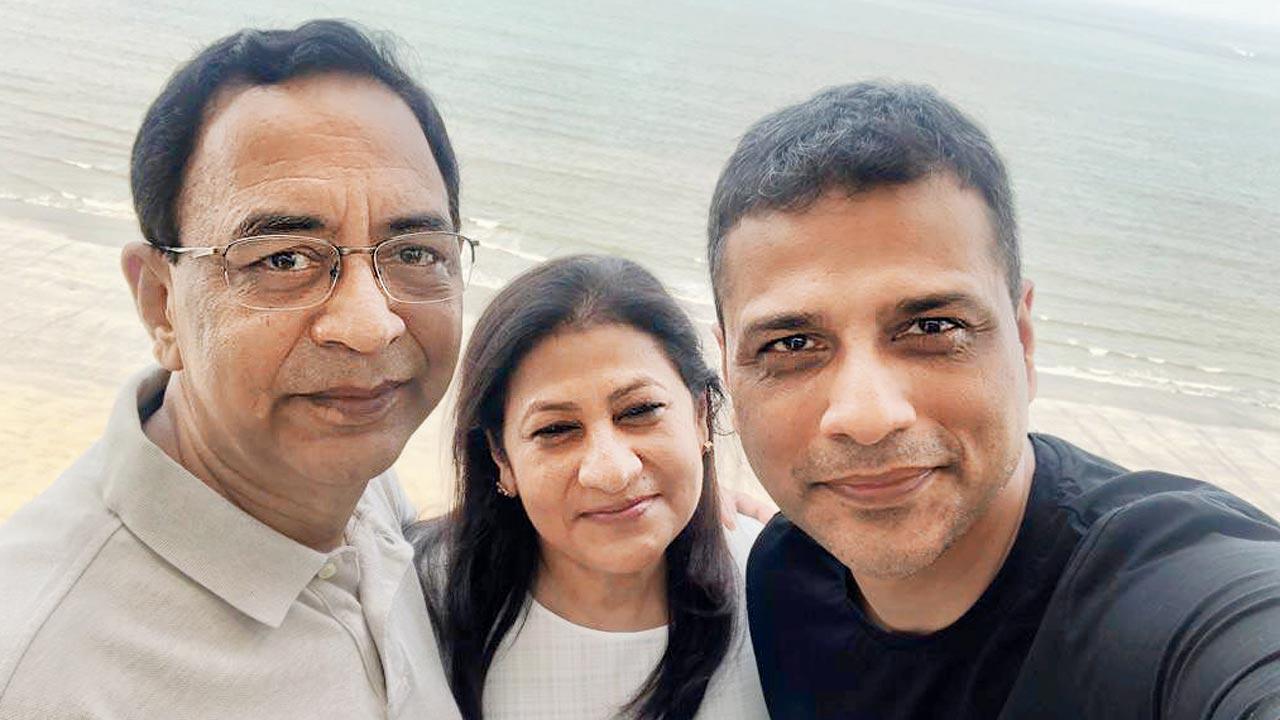 Zulfiqar Khan (far right) with his elder brother Iftikhar and sister-in-law Zeba in happier times. Pic Courtesy/Iftikhar Khan
Zulfiqar Khan (far right) with his elder brother Iftikhar and sister-in-law Zeba in happier times. Pic Courtesy/Iftikhar Khan
On June 23, 2023, Iftikhar got a call from Ambreen Kidwai, who was in Kenya at the time. Her husband, Zaid Sami Kidwai, and Iftikhar’s younger brother Zulfiqar had gone out for dinner the previous night and didn’t return. What followed were a series of shocks, each worse than the previous.
The same day, a taxi was found abandoned in Nairobi, with its engine running and doors open, in the Ole Sereni area in Kenya. It was the taxi that Zulfiqar and Zaid had taken from the restaurant. Their driver Nicodemus Mwange was also missing. Even as a relative rushed to Kenya to make inquiries, Dennis Itumbe, a supporter of the current Kenyan president William Ruto, took to Facebook to declare that Zulfiqar and Zaid had been killed by a rogue Kenyan police unit that had enjoyed unlimited carte blanche under Ruto’s predecessor.
“All we’ve been hearing are stories,” says Iftikhar. “Earlier, we were told that they are alive and will be back soon. Now, the Kenyan authorities say that they fear the worst. Someone even told us, unofficially, that both were killed on the fourth day of their abduction. But the Kenya police has not found a body or clue.”
The lack of closure has compounded the shock of his disappearance and bizarre link to Kenyan politics.
Zulfiqar was Chief Operating Officer with Balaji Telefilms and was on a sabbatical when he disappeared. In fact, the production house’s head Ekta Kapoor had taken to Instagram to appeal to the Government of India to find him. Zulfiqar was a part of the digital campaign team for current president Ruto’s party Kenya Kwanza during the elections.
Two days before he vanished, Zulfiqar had called Iftikhar to say that he had booked his tickets back to Dubai. He had planned to spend a while there.
“Zulfi is the youngest of six siblings, I am the oldest. All of us have pampered him since childhood,” Iftikhar says, smiling despite himself.
In an exclusive report published on October 23, mid-day had accessed the chargesheet filed against 15 former officers of the Kenya Police’s Special Services Unit. The eight-page chargesheet stated that Zulfiqar and Zaid were held captive in the police headquarter premises in Old Nairobi and later taken to the Aberades National Park in Nyeri County.
Coincidentally, President Ruto was on a diplomatic visit to India on the same day that mid-day spoke to Iftikhar. According to news reports, India discussed the issue of Zulfiqar and Zaid’s disappearance with the president of the East African nation. The External Affairs Minister confirmed that the matter was raised at the highest level.
“Yes, we are aware of this [detail]. The lawyer who is representing us in the Kenyan Court is also part of Ruto’s entourage. We got in touch with him, hoping for some interaction, but were told he is busy. Earlier, he had announced that he is overseeing the investigation personally. Are we to believe that the President of a country can’t supervise a missing person’s investigation properly?” Iftikhar wonders.
He points out how all the individuals who had claimed on social media that Zulfiqar was killed are now office bearers in Ruto’s government. How were the rogue cops arrested in the case given bail despite the Khan family’s objection on record and why did the Indian government not seem interested in pursuing the matter? Questions puzzle the family. Iftikhar’s wife Zeba cuts in, entering the camera frame for the first time.
“He doesn’t know how to express his emotions,” she tells us, referring to her husband rattling off facts. “The family is stuck between two stories; one, that he is safe and another that says that he is no more. No evidence to substantiate either. It has been an endless ordeal, filled with agony, anxiety and breakdowns.”
Iftikhar sits stoically as Zeba talks.
“The family is a wreck. All we are asking is that we be told the truth, so that there can be closure. While the new government was taking shape, they said that Zulfi and Zaid are safe. Now, we are hearing something else. We are ready for the truth, whatever that is.”
‘My daughter is gold; when she giggled, the house would light up’
There is not much Amrut Sawant remembers about his sister Dhanashree, but he remembers this: I was known as her brother. She was the popular one. “Everyone loved her,” says her mother, a retired BMC nurse who worked on polio drives, “She was clever, happy, always smiling, and very artistic. Her handwriting was like pearls; she swam, cycled and always ranked among the first five in class, winning a scholarship in seventh and ninth grade. I have stacks of her drawings saved; she won so many medals at drawing contests. People were surprised when they found out she was 95 per cent deaf; she spoke effortlessly. We never worried about her; we knew she would make it in life.”
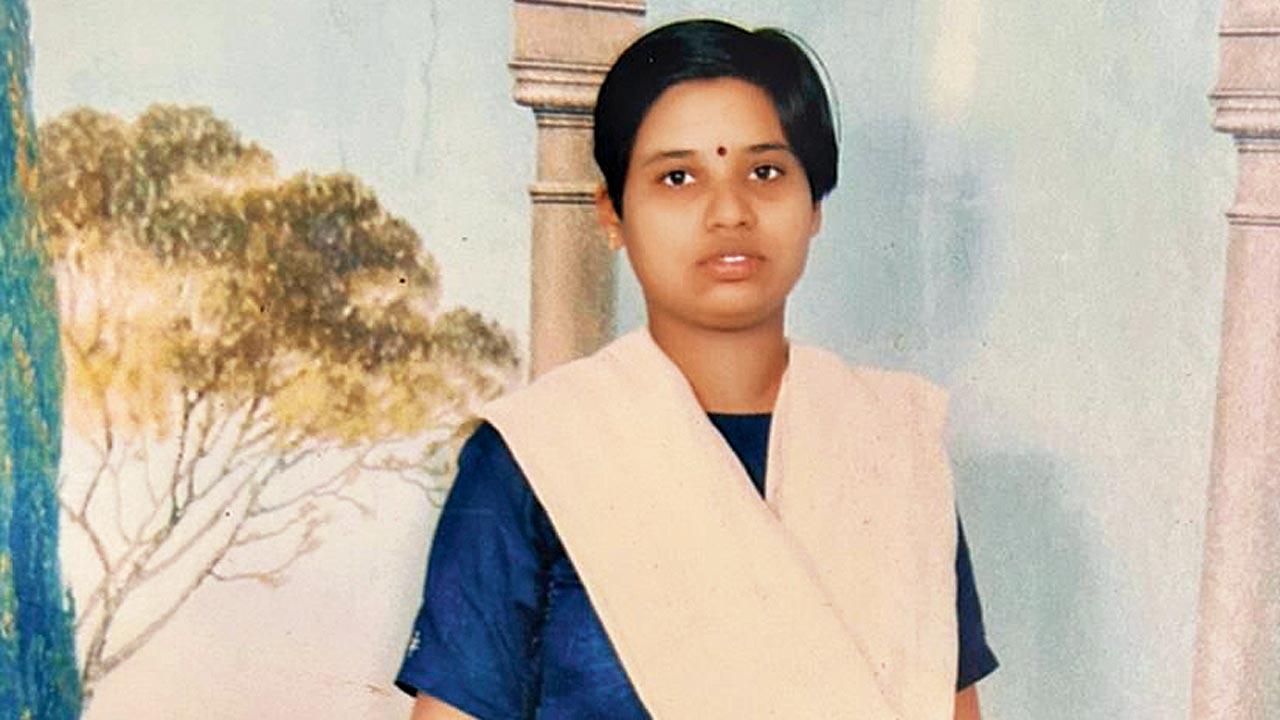 Dhanashree Sawant at 23. Pic Courtesy/Sawant Family
Dhanashree Sawant at 23. Pic Courtesy/Sawant Family
Dhanashree would have been 40 this year. In the nearly two decades since her disappearance in 2006 in Delhi, her parents—Shanta and Vinayak— have retired. Her brother, then 18, is now 36 and the force behind tracing her. He is studying for a Masters in Law. All three became advocates in 2022—her mother topping the batch in 10 semesters—to fight her case in the Bombay High Court.
They no longer live in the RBI quarters at Mumbai Central, around which their world revolved, having moved to the corners of Kharghar, Navi Mumbai, in 2016. Her best friend has got married and fallen out of touch with the family. There are no pictures of her in the house, but an album of them—containing black-and-white snapshots of key moments, some coloured ones taken at professional studios—is close at hand. Her mother is sure she would have been working as an artist by now.
In November 2006, 23-year-old Dhanashree and her father had gone to Delhi for the first time to attend a satsang organised by Sant Nirankari Mission, with a group of people. “I used to attend the satsangs because you would get to hear good things,” says Vinayak, now 69. “I didn’t want them to go,” says Shanta, 58. “But the group convinced me that there was nothing to worry about as all of them were going together, and it was only for three-four days.” On November 13, at the satsang, attendees where sifted into gender based lines at entry, and though Vinayak tried to explain to the security professionals that his daughter was hearing-impaired, they were separated. He told her to wait for him by a white car inside, but never saw her again. Later at the Burhadi police station, they only took down a missing persons complaint; it was one among many who had gone missing from the same event.
 A wall at the Sawant’s Kharghar residence holds the law certificates of all three family members. Her parents and brother became advocates in 2022 to fight her case in the Bombay High Court
A wall at the Sawant’s Kharghar residence holds the law certificates of all three family members. Her parents and brother became advocates in 2022 to fight her case in the Bombay High Court
“We were let down by our own people; nobody told us about the difference between a complaint and an FIR,” says Vinayak, “Nobody told us we could approach the High Court directly. There was no guidance about a Missing Persons Cell… How would common people like us know whom to approach; or how to pressure the police.”
“And those were the days before cellphones [were common] or social media,” says Amrut. If this were today, the family of all those missing from the satsang would have been on a WhatsApp group, sharing resources, pushing for action. Here, Amrut has been propelling the change as social media evolves: First, the only point of contact was the family’s landline. Since then, he has made a page on Facebook. The number is now her mother’s cell phone. The Bombay High Court has got involved, a Bench comprising Justices Revati Mohite-Dere and Gauri Godse reprimanded the police on June 23 this year, saying, “We expect the police to be sensitive. It must be so hard for the parents. Their daughter goes missing. There has to be some closure.”
But the slap on the wrist may be too little, too late: In the first year, Vinayak made many trips to Delhi to follow up with the police, but then Shanta was bedridden for a year by a road accident, and Amrut shared the responsibility to take her to physiotherapy, yoga sessions at Marine Drive and to work.
A few years prior, in 2003, Amrut had to be sent to their village in Ratnagiri to recover from an intense case of psoriasis sparked by a spate of high fever that shot every evening. It’s a disease he still suffers from—at times of stress, his skin inflames to the point of bleeding sores. It has prevented him from having a personal life or marriage.
Slowly, the family began focusing on their younger child. “It took me a few years to understand the gravity of the loss,” says Amrut. “I must have been about 23 when it really sunk in. I don’t have too many memories of her; just general ones about going to school together.”
Shanta and Vinayak taught Dhanashree together: She taking her homework, he taking her on field trips to show her the world. “He’d take her to the vegetable stall, and let her buy them independently; follow her as she cycled to school; show her what a gardener does, a doctor does—all the practical things,” says her mother, “She was in a special school only for three years. She could name all the maidans of Mumbai in their geographical order from south Mumbai; even I can’t do that. She studied Kathak for a year, but then we routed her more towards art when we saw where her talent lay. Just while sitting about, she’d draw mehendi or sketch. Once, she came first in a drawing contest from 5,000 children.”
At the time of her disappearance, Dhanashree was studying painting at the Industrial Training Institute in Agripada. “Only once,” goes on Shanta, who remembers the most about her daughter, “when she was in eighth standard, she asked me why she couldn’t hear when all of us could. After that, she withdrew into a shell, and wouldn’t speak much. We started teaching children for free at home in the hope that she would find someone to talk to.”
Over the years, the family has received phone calls from people claiming to have seen Dhanashree in Mathura, Hyderabad, Poladpur in Raigad, Nashik and Goa. They have gone to each of these places, following it up with the police there.
“Once I got a call from a girl claiming to be Dhanashree,” says Shanta, “But there was a cross connection and I could also hear a man’s voice. Before I could ask her where she was, the call got cut. But we traced the number to Poladpur. When we went there, it turned out to be the house of someone from the Nirankari Mission who was involved in the satsang. He said his young daughter, also named Dhanashree, must have called us. But how could she have the number?” Another time, a police constable accompanied Vinayak to Goa, talking all the while on the phone to a man who said he had seen Dhanashree. But after they landed, he switched off his phone and could not be traced. Several other efforts followed, as they would by parents: A visit to a rescue-and-rehab centre in Kandivli, the doors of a private investigator, and even a man who offered to find her for R5,000. “I offered to write down on bond paper that I would give him whatever price he named,” says Vinayak, “but only after my daughter was found. So many babas, sandhi-sadhus approached us, saying they could find our daughter for a price. You are easy targets for such dupes. We chose to use the path of law.”
The family finally approached the High Court Legal Services committee, and filed a petition seeking an investigation into Dhanashree’s “suspicious” disappearance, and are pushing for a nation-wide search. “We just need to know where she is,” says Amrut confidently, “We’ll pull her out from anywhere.”
“I am sure she’s safe,” says Shanta, “In all these years, I have never felt that something bad has happened to her. I have always known she is safe. We’ve never wronged anyone. How can she not be safe?”
“There is a higher power, you know,” says Vinayak. “This is all a test.”
‘Once Harsh is home, all my demands will start’
The atmosphere in the Arora household in Lal Bahadur Shastri Nagar is of defiant optimism. On the right-hand corner of the front door is an Islamic prayer pasted by the driver who brought Harsh’s brother to the apartment the day he went missing. “When the driver found out,” says Reena, his spouse, “he requested to paste the prayer there, confident that it would guide Harsh back.”
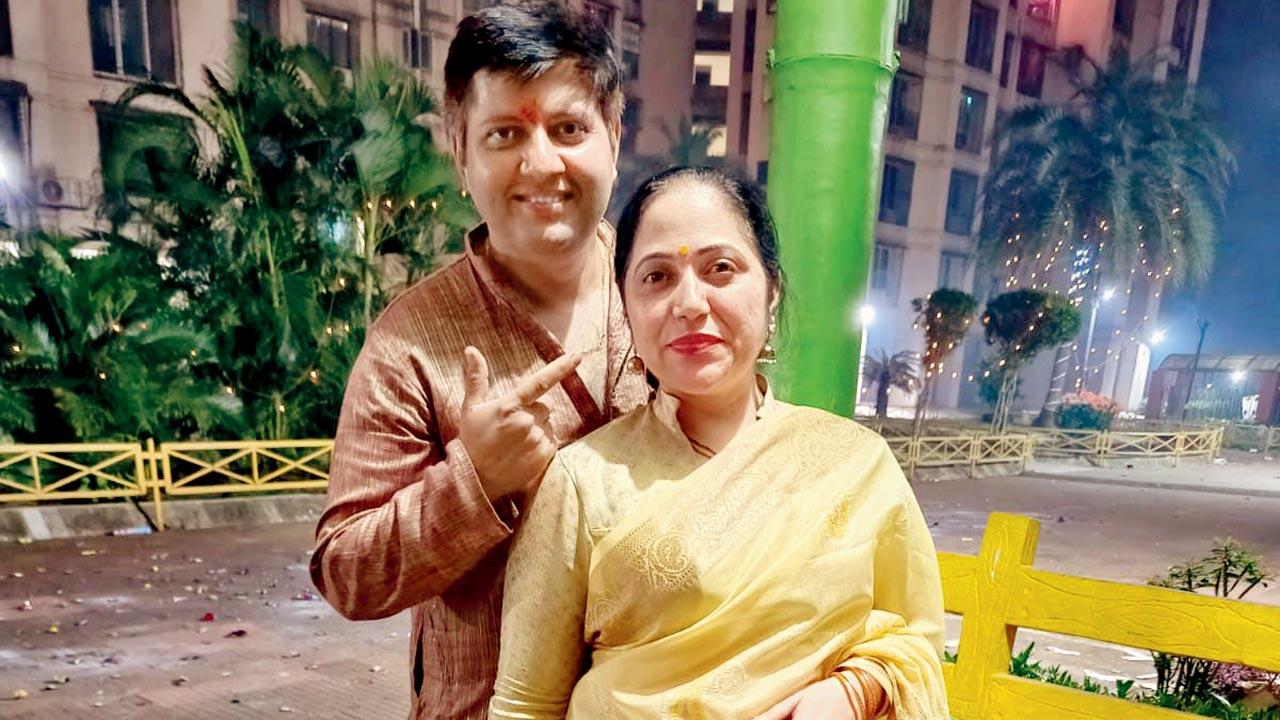 Harsh and Reena Arora have been married 12 years, and known each other for 19. Pic Courtesy/Reena Arora
Harsh and Reena Arora have been married 12 years, and known each other for 19. Pic Courtesy/Reena Arora
Before we sit down to speak, Reena switches off the Mahalakshmi mantra playing on the computer in a loop. “It’s supposed to bring back lost people,” the 41-year-old real estate professional explains. In their bedroom is an energy circle tasked with the same. She asks her mother, who sits wordlessly in the corner of the room, to light the diya at the altar above her; a practice they have only started recently. A tarot card reader has told Reena that Harsh’s lower body is heavy and he needs help. “But he will come back before the year ends. I know he will. He loves his family too much to go away.”
Since October 30, people have been divided into two teams for Reena: “If you are positive that Harsh will come back, you are on my team; If you are going to seed doubt in my mind, tell me to prepare myself for the worse, you are not.”
On that Monday (October 30), Harsh left home at 4.30 am as he did every day, to complete his daily target of 10,000 steps. “He was always urging me to come with him,” says his wife of 12 years. “I have a thyroid problem and he had researched the medication I take so deeply that he recommended that I don’t take it and exercise instead. Banda saat baje aa kar darvaaze pe declare karta, ‘Ten thousand steps done!”
Then followed a well-oiled routine of happy domesticity. He would take their 10-year-old son downstairs to wait for the school bus, while Reena laid out the breakfast table. They’d eat together and head to their jobs: She at a real estate firm in Bhandup, Harsh to his financial institution. Only, that Monday, he didn’t come back or respond to messages. At first, Reena thought he’d gone to pick up his bike from the garage. By evening, she filed a missing persons complaint. CCTV cameras showed Harsh—dressed in a black joggers and vest—at the Airoli junction on the Eastern Express Highway. There has been no news of him after that, and nothing to suggest he engineered his own disappearance.
The couple’s bank account remains untouched. They had been saving up for a house, and a trip to Dubai was planned for December. “I know how to read the real estate market, so we had decided to buy in Thane and didn’t want to take a loan,” says Reena. “No money or gold from the house is missing. On Friday, we had gone to give my karva chauth dress to the tailor. On Sunday, we went out and enjoyed a [BEST] bus ride just like that because our son wanted to.” On weekends, Harsh would take over the kitchen, or get busy gardening within the housing complex. Lately, he’d been into making soaps. “He didn’t like to sit at home on Sundays. Every weekend he would have a plan: Going to Marine Drive or Thane. Or just freaking out [sic] with friends at Chaayos.”
The couple’s WhatsApp exchanges paint a picture of everyday joys: Discussions of which shoe rack to buy (“This one has a lock”). A photo of him and their son, at a friend’s birthday party (“Giving him batman soap as present” from him). Pictures from Reena asking opinions on what to wear to a party; “Have you seen my grey trousers?” The odd picture of a chaotic wardrobe (“What is this mess?” From him. “His cupboard is always neatly organised. I get only one day off,” she says sheepishly). The mangalsutra he was supposed to buy her in March (“It’s the first thing I’ll make him buy for me when he gets back. Now all my demands will start.”). And then that angry message from her on October 30: This is just not done, Harsh. You are not responding to calls. Call me as soon as you can.
“I have been his wife for 12 years; we dated for seven years before that. Ours is a didi tera deewana-type love story. His elder brother is married to my cousin and we met at their wedding. We did everything together: If something had happened to him, I would know in my heart.” Though she addresses him by his name and uses the pronoun ‘tu’, Harsh’s number is saved as ‘Aap’ on her phone.
Reena observed karva chauth in the week after Harsh’s disappearance. When Diwali came, she hoped the sound and sight of firecrackers would jolt Harsh’s memory, like it does in the movies. Every other day, a member of the family does a round of Bhandup Police station to check on progress. Posters of Harsh have been circulated on social media.
Reena breaks down only once during our conversation, when we ask her how she has been sleeping. “I have thyroid, so the exhaustion takes over by evening and I shut down. So far, I have been in ‘doing’ mode, but now I have to run the house, go to work and take care of my son. I am not thinking about what will happen on a single-income. My friend, who is a lawyer, has told me to think practically, about my finances. But I don’t want to let even a sliver of negativity enter my mind. People have told me to be clear about what I am wishing for: I say that I will accept him in whatever condition he comes: Whether he has use of all his faculties, whether he can work again or not. There is God. He will take care of us. Our son turns 11 in December. If Harsh returns before that, it will be like a wow [sic]. Then, I will also join him for his morning walk. Just not as early as 4.30!”
 Subscribe today by clicking the link and stay updated with the latest news!" Click here!
Subscribe today by clicking the link and stay updated with the latest news!" Click here!







